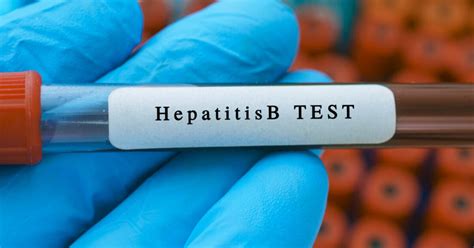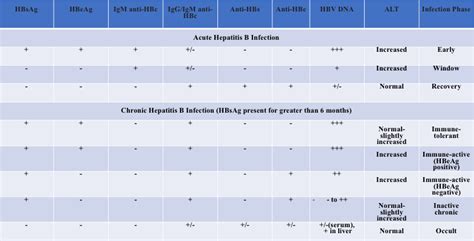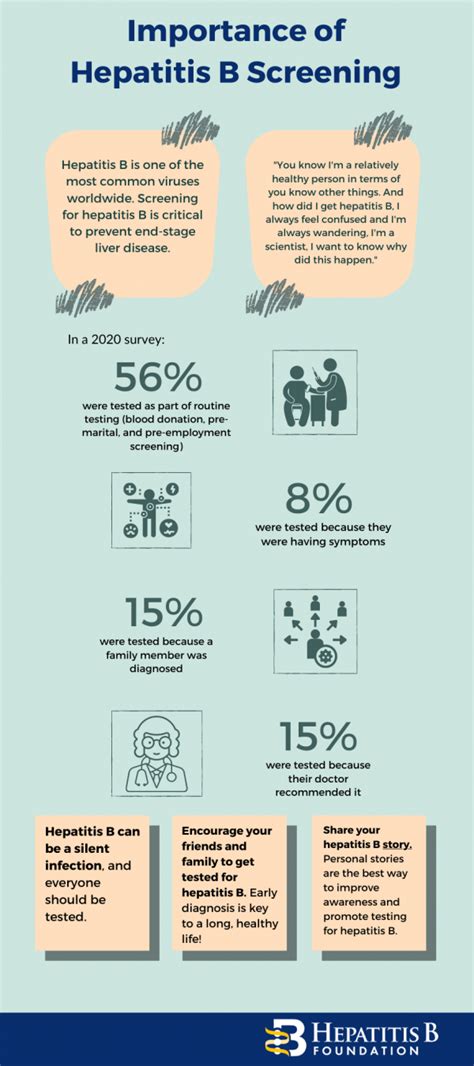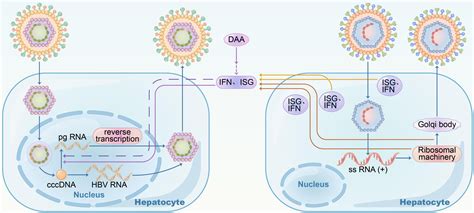Intro
Discover 5 ways Hepatitis B screening saves lives, including liver disease prevention, vaccine benefits, and diagnostic testing methods, to promote early detection and treatment of this infectious disease.
Hepatitis B is a serious liver infection caused by the hepatitis B virus (HBV) that can lead to severe health complications, including liver cancer and cirrhosis. According to the World Health Organization (WHO), approximately 257 million people worldwide are living with chronic hepatitis B infection, resulting in about 900,000 deaths each year. Early detection and treatment are crucial in managing the disease, and hepatitis B screening plays a vital role in this process. In this article, we will explore the importance of hepatitis B screening, its benefits, and the various methods used to detect the virus.
The significance of hepatitis B screening cannot be overstated. It helps identify individuals who are infected with the virus, allowing them to receive timely medical attention and prevent the progression of the disease. Moreover, screening enables healthcare providers to monitor the effectiveness of treatment and make informed decisions about patient care. With the advancements in medical technology, various screening methods have been developed to detect hepatitis B, each with its own set of advantages and limitations.
Hepatitis B screening is essential for individuals who are at high risk of contracting the virus, such as those who have had multiple sex partners, shared needles, or have been exposed to infected blood. Additionally, pregnant women, healthcare workers, and individuals traveling to areas with high hepatitis B prevalence should also undergo screening. By doing so, they can protect themselves and their loved ones from the potential risks associated with the virus.
Introduction to Hepatitis B Screening

Hepatitis B screening involves a series of tests that detect the presence of the virus in the blood. The most common screening method is the hepatitis B surface antigen (HBsAg) test, which identifies the protein on the surface of the virus. Other tests, such as the hepatitis B core antibody (HBcAb) and hepatitis B surface antibody (HBsAb) tests, can also be used to detect the virus and determine the stage of infection. These tests are typically performed using a blood sample, which is then sent to a laboratory for analysis.
Benefits of Hepatitis B Screening
The benefits of hepatitis B screening are numerous. Early detection allows individuals to receive prompt medical attention, reducing the risk of complications and improving treatment outcomes. Screening also enables healthcare providers to identify individuals who are at risk of transmitting the virus to others, such as pregnant women and healthcare workers. By detecting the virus early, individuals can take steps to prevent transmission, such as practicing safe sex, avoiding sharing needles, and getting vaccinated.Methods of Hepatitis B Screening

There are several methods used to screen for hepatitis B, including:
- HBsAg test: This is the most common screening method, which detects the presence of the hepatitis B surface antigen in the blood.
- HBcAb test: This test detects the presence of antibodies against the hepatitis B core antigen, indicating a current or past infection.
- HBsAb test: This test detects the presence of antibodies against the hepatitis B surface antigen, indicating immunity to the virus.
- Hepatitis B DNA test: This test detects the genetic material of the virus, allowing healthcare providers to monitor the effectiveness of treatment.
- Liver function tests: These tests measure the levels of liver enzymes in the blood, indicating liver damage or inflammation.
Who Should Undergo Hepatitis B Screening
Hepatitis B screening is recommended for individuals who are at high risk of contracting the virus. These include: * Individuals who have had multiple sex partners * Individuals who have shared needles or other equipment to inject drugs * Healthcare workers who have been exposed to infected blood or other bodily fluids * Pregnant women * Individuals traveling to areas with high hepatitis B prevalence * Individuals who have been diagnosed with other sexually transmitted infectionsImportance of Hepatitis B Screening in Pregnancy

Hepatitis B screening is particularly important in pregnancy, as the virus can be transmitted from mother to child during childbirth. According to the Centers for Disease Control and Prevention (CDC), approximately 25,000 infants are born to hepatitis B-infected mothers each year in the United States. If left untreated, up to 90% of these infants will become chronically infected with the virus. Hepatitis B screening in pregnancy enables healthcare providers to identify infected mothers and take steps to prevent transmission to the newborn, such as administering hepatitis B immune globulin and vaccinating the infant.
Challenges and Limitations of Hepatitis B Screening
Despite the importance of hepatitis B screening, there are several challenges and limitations associated with it. These include: * Limited access to screening services, particularly in resource-poor settings * High costs of screening tests, which can be a barrier to access for many individuals * Limited awareness of the importance of hepatitis B screening, particularly among high-risk groups * Stigma associated with hepatitis B infection, which can discourage individuals from seeking screening and treatmentFuture Directions in Hepatitis B Screening

The future of hepatitis B screening looks promising, with several advancements in technology and testing methods. These include:
- Point-of-care testing: This involves using rapid, portable tests that can be performed at the point of care, reducing the need for laboratory testing and enabling faster diagnosis and treatment.
- Molecular testing: This involves using genetic material to detect the virus, allowing for more accurate and sensitive testing.
- Non-invasive testing: This involves using non-invasive methods, such as saliva or urine testing, to detect the virus, reducing the need for blood sampling and making testing more accessible.
Conclusion and Recommendations
In conclusion, hepatitis B screening is a critical component of hepatitis B prevention and control. Early detection and treatment can significantly reduce the risk of complications and improve treatment outcomes. We recommend that individuals at high risk of contracting the virus undergo screening, and that healthcare providers prioritize hepatitis B screening in their clinical practice. By working together, we can reduce the burden of hepatitis B and improve the health and well-being of individuals and communities worldwide.What is hepatitis B screening?
+Hepatitis B screening involves a series of tests that detect the presence of the hepatitis B virus in the blood.
Who should undergo hepatitis B screening?
+Individuals who are at high risk of contracting the virus, such as those who have had multiple sex partners, shared needles, or have been exposed to infected blood, should undergo screening.
What are the benefits of hepatitis B screening?
+The benefits of hepatitis B screening include early detection and treatment, reduced risk of complications, and improved treatment outcomes.
We hope this article has provided you with a comprehensive understanding of hepatitis B screening and its importance in preventing and controlling the disease. If you have any questions or comments, please do not hesitate to reach out to us. Share this article with your friends and family to help raise awareness about hepatitis B and the importance of screening. Together, we can make a difference and reduce the burden of this devastating disease.
